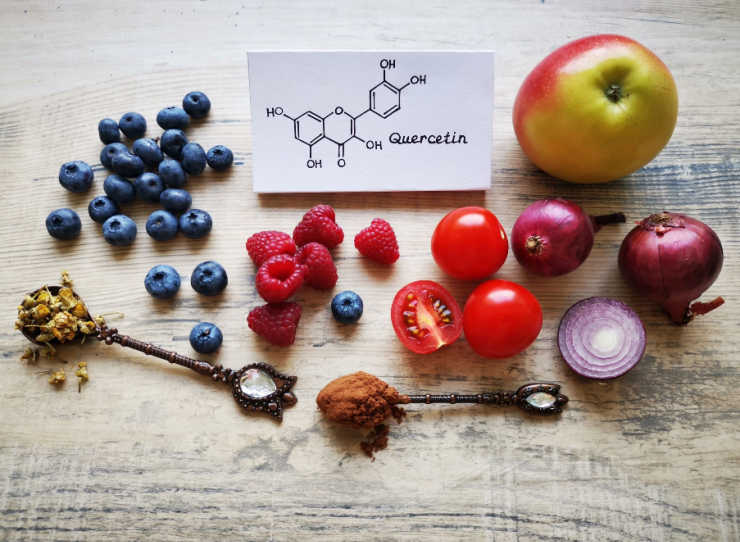What do you know about quercetin? At Mercola.com, Dr. Joseph Mercola explains the benefits of the flavonoid, writing:
Quercetin is a natural flavonoid found in small quantities in many foods, such as apples, berries, onions, broccoli, black tea and a flower from the Sophora japonica tree.
Widely distributed in the plant kingdom, quercetin has played an important role in traditional health practice for centuries.
Another powerful antioxidant, pterostilbene is naturally produced by blueberries and other small berries, but the amount each berry produces is incredibly small.
You’d have to eat several hundred pounds of blueberries to get a significant amount of pterostilbene.
So the same two basic facts about quercetin and pterostilbene prevent you from getting sufficient amounts:
- You would need to consume impossibly or undesirably large amounts of their richest sources (along with their large sugar content).
- In their natural states, the bioavailability, or your body’s ability to absorb them, is poor or inadequate.
In other words, even if you could consume large enough amounts of blueberries, apples, onions and other good sources of quercetin and pterostilbene, you still may not fully benefit from these two outstanding antioxidants.
Why would you want more quercetin and pterostilbene than these foods can provide? First, let’s start with quercetin, the one you’re likely more familiar with…
How Quercetin Benefits You
Western scientists began studying quercetin around the same time the Nobel Prize was awarded in 1937 for the discovery of vitamin C and rutin, a quercetin-containing bioflavonoid.
Quercetin offers an impressive array of potential health benefits, as it supports:
- Natural defenses against seasonal threats.*
- Lung and bronchial tract health.*
- Production of new mitochondria in your brain and muscle.*
- A healthy, normal immune response.*
- Protection of cells and tissues against free radical damage.*
- A normal, healthy histamine release.*
- An already normal inflammatory response.*
- Mental performance following physical stress.*
- Supports healthy cellular aging.*
- Protection against lipid peroxidation in your cells and tissues.*
- Metabolic health.*
While quercetin offers some impressive potential benefits, there’s something else that makes it stand out among antioxidants.
Why Quercetin Enhances Exercise Performance and Recovery
Recent studies suggest that exercise and antioxidant supplements may work against each other. In fact, one study shows that certain antioxidants can counteract some of the beneficial effects of exercise.
“Direct” antioxidants, like vitamins C and E, react directly and quench free radicals.
On the other hand, quercetin and other polyphenols enhance your body’s inner antioxidant response, performing their “antioxidant” activity indirectly. They do this through the expression of certain genes and through the Nrf2-mediated stimulation of your cell’s antioxidant system.
What does this have to do with the effects of exercise on your body?
During exercise, your consumption of oxygen increases and so does your mitochondrial activity. As a normal response, reactive oxygen species are produced.
When you take a vitamin C supplement during exercise, because it works to quench free radicals, it may, at the same time, lower your endurance capacity, because some free radicals are actually important biological signaling molecules.
Because of quercetin’s indirect response on free radicals, you may actually experience greater endurance.
Triathlon athletes, for example, need high levels of endurance and fast recovery to get through training and competitions.
One of the biggest challenges for triathlon athletes is the oxidative stress that occurs during exercise. Intense training increases the production of free radicals and reactive oxygen species, which can cause delayed recovery and post-training discomfort.
This is where certain antioxidant compounds, especially quercetin, can help.*
In a recent study, a group of 23 triathlon athletes took 250 mg of quercetin phytosome twice daily while a control group of 25 used none. At the end of the 14-day study, performance, post-training discomfort, cramps, time to full recovery and oxidative stress were measured.
Compared to the control group, the group that supplemented with the quercetin phytosome saw more improvement in both performance and endurance.
They were able to reduce their time to complete the race by approximately 10% after two weeks – some even reported that they found their experience to be more pleasant and less stressful.
Overall, here’s what researchers found with the quercetin phytosome group:
- Post-run muscular discomfort incidence was lower.
- Cramps and localized discomfort were improved.
- Post-recovery time was considered better.
- Oxidative stress was reduced.
It’s important to note that these results were seen with quercetin phytosome, not regular quercetin. Because of quercetin’s typical low bioavailability, you wouldn’t expect to see the same results with non-phytosomal quercetin.
Research Leads to the Development of a Quercetin Supplement for Military Personnel
Maintaining the health of soldiers and other military personnel during training and deployment is a top government priority. In 2007, the U.S. Department of Defense set out to see whether quercetin might be a useful tool for their personnel.
After directly funding human research, they uncovered some interesting effects of quercetin on wellness and mental performance:
- Cyclists enduring physical stress for three days in a row were nine times more likely to remain well when taking quercetin, compared to those who didn’t.*
- Athletes taking quercetin maintained their ability to react to an alertness test when exhausted, compared to the much slower response of those in the placebo group.
Convinced of quercetin’s potential benefits, the U.S. government developed a quercetin supplement for their military personnel.
That supplement is still used today.
Read more here.
If you’re willing to fight for Main Street America, click here to sign up for the Richardcyoung.com free weekly email.





